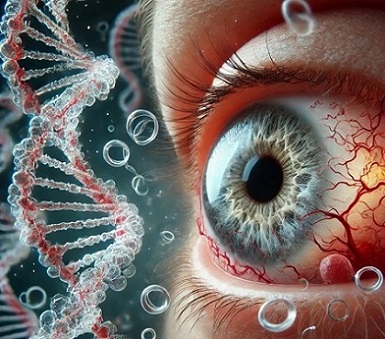Nikhil Prasad Fact checked by:Thailand Medical News Team Jul 05, 2024 9 months, 1 week, 3 days, 17 hours, 37 minutes ago
Diabetes News: Diabetic retinopathy is a severe complication of diabetes that can lead to blindness. As diabetes becomes more common, the number of people affected by diabetic retinopathy is increasing. This condition affects the eyes, specifically the retina, which is the light-sensitive layer at the back of the eye. The retina is crucial for vision, and any damage to it can severely impact one's ability to see.
 The Role of MicroRNA in Diabetic Retinopathy
Image - AI Generated
The Role of MicroRNA in Diabetic Retinopathy
The Role of MicroRNA in Diabetic Retinopathy
Image - AI Generated
The Role of MicroRNA in Diabetic Retinopathy
Recent research conducted by researchers from the Hospital of Chengdu University of Traditional Chinese Medicine-China that is covered in
this Diabetes News report, has highlighted the role of microRNA in linking diabetic retinal neurodegeneration (nerve damage) and vascular degeneration (damage to blood vessels). MicroRNAs are small molecules that help regulate gene expression. They play a significant role in many biological processes, including the development and progression of diseases like diabetic retinopathy.
How Diabetic Retinopathy Develops
Diabetic retinopathy develops when high blood sugar levels damage the blood vessels in the retina. This damage leads to two main problems:
-Neurodegeneration: This is the damage or loss of nerve cells in the retina.
-Vascular Degeneration: This is the damage to the blood vessels in the retina.
Both of these processes contribute to the progression of diabetic retinopathy and can eventually lead to blindness if not properly managed.
The Connection Between Neurodegeneration and Vascular Degeneration
The retina’s nerve cells and blood vessels are closely connected. Damage to one often leads to damage to the other. For instance, high blood sugar levels can cause oxidative stress and inflammation, which harm both nerve cells and blood vessels. This dual damage worsens diabetic retinopathy.
The Role of MicroRNA
MicroRNAs help regulate the body's response to high blood sugar and the resulting damage to the retina. They influence several key processes, including:
-Oxidative Stress: This is an imbalance between free radicals and antioxidants in the body, leading to cell damage. MicroRNAs can help reduce oxidative stress by regulating the production of antioxidants.
-Inflammation: Chronic inflammation can damage the retina. Certain microRNAs help control the inflammatory response, reducing damage to the retina.
-Apoptosis: This is the process of programmed cell death. MicroRNAs can help prevent excessive cell death in the
retina, protecting nerve cells and blood vessels.
Potential Treatments Involving MicroRNA
Understanding the role of microRNA in diabetic retinopathy opens new avenues for treatment. Researchers are exploring several strategies:
-MicroRNA-Based Therapies: These involve using microRNAs to regulate gene expression and protect the retina from damage. For example, increasing the levels of certain protective microRNAs can help reduce oxidative stress and inflammation.
-Anti-VEGF Therapy: Vascular endothelial growth factor (VEGF) promotes the growth of new blood vessels. In diabetic retinopathy, abnormal blood vessel growth can lead to further damage. Anti-VEGF drugs can help control this growth, and microRNAs may enhance the effectiveness of these drugs.
-Stem Cell Therapy: Exosomes derived from stem cells can deliver beneficial microRNAs to the retina, helping to repair damaged tissue and reduce inflammation.
Current Challenges and Future Directions
While the potential of microRNA-based treatments is exciting, there are still many challenges to overcome. These include:
-Targeting Specific Cells: Ensuring that microRNA therapies reach the right cells in the retina without affecting other tissues is crucial.
-Delivery Methods: Developing safe and effective ways to deliver microRNAs to the retina is another major challenge.
-Clinical Trials: More research is needed to test the safety and effectiveness of these treatments in humans.
Conclusion: A Promising Future
The study of microRNAs in diabetic retinopathy is still in its early stages, but the findings so far are promising. These tiny molecules have a big impact on the health of the retina and could lead to new, more effective treatments for diabetic retinopathy. By understanding and harnessing the power of microRNAs, we may be able to better protect the vision of millions of people with diabetes.
Final Thoughts
Diabetic retinopathy is a complex disease, but research into microRNAs is shedding light on new ways to combat it. With continued research and development, we hope to see more effective treatments that can prevent blindness and improve the quality of life for those with diabetes. The future looks bright for those battling diabetic retinopathy, thanks to the promising potential of microRNA-based therapies.
The study findings were published in the peer reviewed journal: Frontiers in Endocrinology.
https://www.frontiersin.org/journals/endocrinology/articles/10.3389/fendo.2024.1412138/full
For the latest
Diabetes News, keep on logging to Thailand Medical News.
Read Also:
https://www.thailandmedical.news/news/honokiol-as-a-natural-alpha-glucosidase-inhibitor-for-diabetes-management
https://www.thailandmedical.news/news/seaweed-and-diabetes-can-brown-seaweed-help-control-blood-sugar-levels
